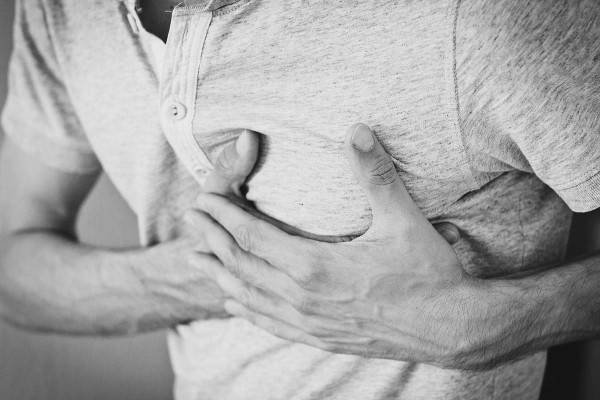Costochondritis
Costochondritis is not a life-threatening condition, but its causes are largely unknown. In costochondritis, pain occurs where the ribs meet the sternum. It is important to know that our ribs rise and fall when we breathe or move along with natural body rotations. Now, if the back rib joints (where the ribs meet the spine) are like frozen in place and can't move, the more sensitive joints where the ribs meet your sternum have to work excessively to allow you to breathe or move at all. This is why you feel that sharp, stabbing pain and - as the rib joints on your sternum "give way" with movement - audibly click. What you need to do now is to get the "frozen" rib machinery around your back free and moving again. Then the stressful rib joints at the sternum can settle down again.
Steve August, the inventor of the Backpod®, once suffered from costochondritis himself:
"I suffered from costochondritis myself for seven years after falling on my rib cage while climbing. I had this stabbing pain in my chest area, difficulty breathing, and most of all, I was afraid of having a heart attack. After completing my training as a physiotherapist in New Zealand, I got the condition under control and have not felt the slightest stabbing pain in decades. I can play any sport and am completely cured."
Important - in case of acute chest pain you should always contact a doctor!
Tietze syndrome and Slipping ribs
Tietze syndrome is also costochondritis with noticeable swelling at the rib joints by the sternum. It's like when your ankle swells after you twist your foot (this swelling is NOT an autoimmune reaction. When comparing groups of patients with and without costochondritis, studies have shown no difference in inflammatory markers in the blood). Therefore, the treatment method is the same as for costochondritis, which involves releasing the blocked rib joints in the back. The swelling often hardens into local scarring. In this case, additional massage and stretching of the pectoral muscles is often needed. If you treat the hardened swelling twice a day with an anti-inflammatory gel, such as Voltaren (diclofenac), or CBD oil, such as Penetrex, it will also slowly subside.
The condition "slipping ribs" (abnormally mobile ribs) occurs much less frequently than costochondritis and Tietze syndrome, but the causes are the same. If the joints where the ribs are suspended from the spine cannot move, other areas of the chest MUST move more in order for you to breathe. This extra movement can occur, for example, on the rib side where the ribs transition from bone to cartilage at the articulationes costochondrales. The treatment approach is as logical as for costochondritis. Free the blocked rib joints in the back that are responsible for the problem.
BackpodTV
Wir haben eine umfangreiche Auswahl an Tutorials und informativen Videos erstellt und auf Youtube veröffentlicht, damit Sie bequem darauf zugreifen können.


